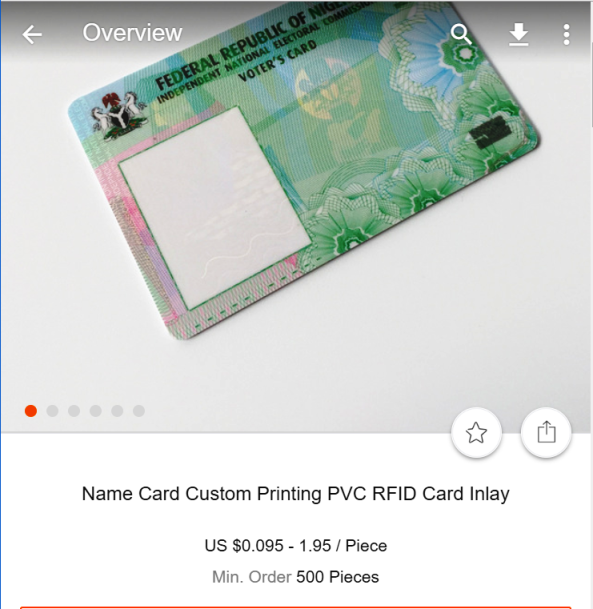By Oluwatobi Opusunju and Chinedu James
With less than seven months to Nigeria’s general elections, the Independent National Electoral Commission (INEC) is contending with cloned permanent voters’ cards (PVCs) which recently surfaced online for sale in what could erode voters’ confidence in a free and fair election next February 15, 2019.
The cloned PVCs appeared online this week and were up for sale on Alibaba.com, China’s giant e-commerce platform. The cloned PVCs have same semblance with the one being issued by INEC ahead of the general elections; and they are branded with the Nigerian colour and logo.
Millions of Nigerians are worried and have expressed their fears on possible breach of the country’s electoral integrity and national security.
Atiku Abubakar reacts
Presidential aspirant and former Vice President, Atiku Abubakar reacting through a letter sent to Alibaba.com has demanded the portal removes the items from its platform. Atiku said the situation threatens Nigeria’s desire to build strong institutions like the INEC and undermines the possibility of having a free and fair election.
His letter reads: “My attention has been drawn to an egregious breach of Nigeria’s electoral integrity and thus our national security, by the sale of Nigerian Permanent Voter Cards, on alibaba.com.
“A situation like this could lead to massive vote buying and thus thwart our efforts and instead create strong men where we want to enable strength in institutions.”
INEC against digital breaches
However, in a statement by Director of Voter Education and Publicity at INEC, Oluwole Osaze Uzzi, the commission stated that “the clone and sale of the cards were anticipated and measures have been taken to preserve and further secure electoral materials.”
Uzzi further stated: “Several security features and secret source codes are contained in the Smart Card Readers, which enable them to read only PVCs duly issued by the Commission. The advertisement shows photographs of blank cards, which have not been personalised and which do not contain any details.
“This notwithstanding, the Commission wishes to state that it takes these reports seriously and will engage the government and security agencies as well as the promoters of the platform in order to get to the root of it and take all necessary action to take down the advertisement forthwith.
“In addition to the existing features, the Commission is already working to further secure the PVCs and the Smart Card Readers and will continue to protect them from unauthorized and malicious access. It is for this reason that, beginning from next week, we are commencing the systematic hardware and software upgrade of all the Smart Card Readers nationwide. It is worthy of note that this enhancement had already been successfully done in Ekiti and Osun, preparatory to the upcoming Governorship elections in both States.
“We wish to reassure the public that our system are robust even as we fortify them ahead of the 2019 general elections.”
But some politicians are still expressing misgivings on INEC’s preparedness against possible digital breaches.
“We do not know what the electoral umpire has on ground to check against incidence like this. We would need further assurances that they are alert and prepared to checkmate possible abuses,” said one chieftain of Kowa Party.
One IT expert in Abuja, Emmanuel Dogun, believes cloning of PVCs and such similar digital infraction should be expected. “It is left for the INEC to keep abreast of such situations and nip them as they arise,” said Dogun.































